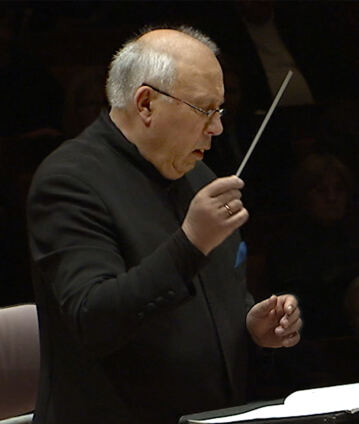Neeme Järvi conducts Strauss’s “Don Juan” and Shostakovich’s Symphony No. 14

Shostakovitch’s 14th Symphony is a highly unusual work. With frugal musical forces, it takes death as its theme. It forgoes all pathos yet is all the more haunting because of this. In contrast, this concert with Neeme Järvi also includes Richard Stauss’s Don Juan and Tchaikovsky’s Francesca da Rimini, compositions which also deal with death, however in both cases it is combined with a highly luxurious orchestration.
The haunting and colourful works in this concert with Neeme Järvi shed light on the relationship between music and literature, each from a different perspective. In his Symphony No. 14 for example, the already seriously ill Shostakovich set eleven poems, all of which revolve around the subject of death in various ways. No less unusual are the musical forces he employs, with Shostakovich foregoing wind instruments completely and, through the combination of strings, vocal soloists and percussion alone, developing a unique sound which surprises again and again.
In contrast, the programme of this concert with Neeme Järvi also includes Richard Strauss’s Don Juan – a contrast not only because of its irrepressible hero, but also because of the way the young composer so confidently displays his mastery of the full orchestra. Like Don Juan, Pyotr Ilyich Tchaikovsky’s Francesca da Rimini is also based on literature without the narrative being set directly. In Francesca da Rimini, the starting point is Dante’s Divine Comedy – although there is also another clear influence to be heard, namely Richard Wagner’s Ring des Nibelungen, which Tchaikovsky had heard in Bayreuth shortly before composing his own work.
© 2010 Berlin Phil Media GmbH
Related interviews
Artists
Our recommendations
- 1996 Europakonzert from St Petersburg with Claudio Abbado
- Arcadi Volodos plays Tchaikovsky’s Piano Concerto No. 1
- An “Oriental Night” with Neeme Järvi and Janine Jansen at the Waldbühne
- Neeme Järvi conducts Grieg’s “Peer Gynt” Suites
- Andrés Orozco-Estrada and Leif Ove Andsnes
- Zubin Mehta conducts Bruckner and Messiaen